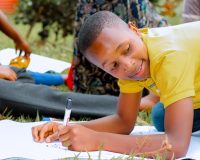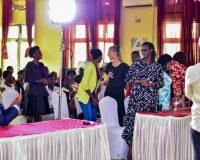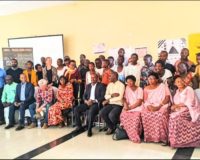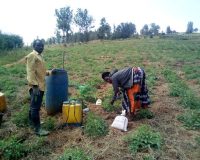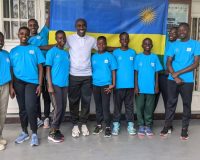5,000 rural young people had empowered through agriculture/ farming as a business.
Despite social and economic progress, Rwanda remains very poor. In the Eastern Province, 38% live below the poverty line and 15.5% are extremely poor (NISR, 2016). Rural youth, particularly young women remain economically disenfranchised and formal employment is limited due to lack of skills and jobs of course. 70.2 % of youth work mainly in subsistence farming (IDRC, 2015) which is considered as an ’employment of last resort’ due to its low status and income in previous years. They lack information on how farming can be made profitable. Yet, despite vulnerability to climate change, Rwanda has favorable conditions for horticulture which can maximize smallholders’ returns. Moreover, from 2013 till now the government prioritized horticulture as part of its export growth strategy.
UNM is a Rwandan organization that has almost twenty years of experience in providing vulnerable children, young people, and their communities with comprehensive support of mental health services, advocacy, shelter, education, legal protection, and livelihoods development. One of its core programs is “Economic empowerment” which empowers vulnerable rural young people to build lives of self-reliance and dignity for themselves, their families, and the wider community through agribusiness. In the last seven years, the program was implemented in 7 sectors of the RWAMAGANA district and funded by Comic Relief, World Jewish Relief, and DFID. It successfully mobilized more than 5,000 rural young people, 60 % of which were women at risk (single mothers and teen mothers). Participants formed groups and associations that worked together and offered each other solidarity and peer support to grow high-value horticulture crops and increased their income on average by 142%, and started to save from 200 to 500frw and invest.
The significant achievement was continued transformation of mindset (from feeling helpless and dependant on handouts to bringing in control over one’s life; increasing earning capacity and control over income and subsequently able to meet basic needs, increased self-esteem and self-confidence to speak in public fulfill responsibility and vision of the future, play a notable role in decision making). Through the whole process of empowerment, 7 cooperatives were formed already and 355 groups are networking to become cooperatives for the sustainable development of rural farmers. The program has set stable ground with strong relationships, credibility, and connection among communities, local authorities, and other operational institutions. Furthermore, it was adapted to lessons learned from the rigorous mechanism that collects robust field data regularly to be analyzed and used for decision making.
In addition, we have set models and structures that effectively and sustainably provide knowledge of good agricultural practices and soft skills. We have established community focal points (field facilitators, peer support, and youth committees) and strong monitoring, evaluation, and learning system that is based on record-keeping model processes, data tracking monitoring, reflections sessions, data manipulation analysis, and dissemination of findings and new lessons using technology.
Despite favorable climatic conditions (temperature, rainfall, and sunshine) and fertile soils, its natural resources remain severely underutilized and often mismanaged. And the farming population (90%) remains very poor. Rural youth (14-35 ages according to official Rwandan definition) make up much of the potential workforce, yet remain economically disenfranchised. Formal employment options continue to be limited for young people due to a lack of literacy, numeracy, employability, and work experience. Moreover, young people suffer from a mindset of victimhood; fatalism, and incapacity which is prevalent in the rural communities especially. Low access to information is also a challenge due to the low capacity to adapt the knowledge on both soft and agronomic skills, which always limit them to more opportunities including market negotiations, use of technologies, and the importance of being cooperatives to connect with different opportunity and also lack of profitability target approaches.
Due to covid19 effects, the level of dependence has increased also because more youth have gone back to their rural areas from their informal work and they are just idle because they don’t have an idea of how much farming can be profitable.
In order to break this clipping cycle of poverty and resignation, there is an urgent and clear need for effective, comprehensive, well-adapted, and empowering interventions that will transform young people’s mindsets and fulfill their potential. Based on the organizational exceptional experience in working with vulnerable young people and mindset transformation, the program has the capacity to manage funds and help to effectively eradicate poverty by empowering young people to significantly and sustainably improve their income through building their technical and business skills, helping them to choose best agronomic opportunities and facilitate market access. As well as the ability to support 5,000 participants to access validated market and employment opportunities, develop confidence and skills, build networks and promote positive gender norms to achieve economic empowerment.








